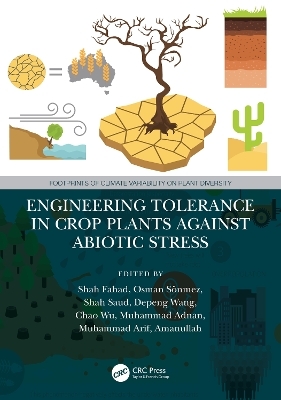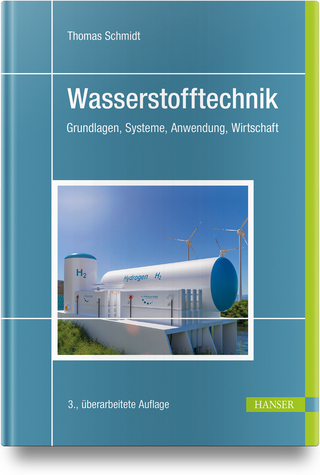
Engineering Tolerance in Crop Plants Against Abiotic Stress
CRC Press (Verlag)
978-0-367-75009-1 (ISBN)
Despite significant progress in increasing agricultural production, meeting the changing dietary preferences and increasing food demands of future populations remains a significant challenge. Salinity, drought, water logging, high temperature and toxicity are abiotic stresses that affect the crop yield and production. Tolerance for stress is a important characteristic that plants need to have in order to survive. Identification of proper techniques at a proper time can make it easy for scientists to increase crop productivity and yield. In Engineering Tolerance in Crop Plants against Abiotic Stress we have discussed the possible stresses and their impact on crops and portrayed distinctive abiotic stress tolerance in response to different techniques that can improve the performance of crops.
Features of the Book:
Provide a state-of-the-art description of the physiological, biochemical, and molecular status of the understanding of abiotic stress in plants.
Address factors that threaten future food production and provide potential solution to these factors.
Designed to cater to the needs of the students engaged in the field of environmental sciences, soil sciences, agricultural microbiology, plant pathology, and agronomy.
New strategies for better crop productivity and yield.
Understanding new techniques pointed out in this book will open the possibility of genetic engineering in crop plants with the concomitant improved stress tolerance.
Dr Shah Fahad is an Assistant Professor in the Department of Agronomy, University of Haripur, Khyber Pakhtunkhwa, Pakistan. He obtained his PhD in Agronomy from Huazhong Agriculture University, China, in 2015. After doing his postdoctoral research in Agronomy at the Huazhong Agriculture University (2015–17), he accepted the position of Assistant Professor at the University of Haripur. He has published over 270 peer-reviewed papers (Impact factor 810.45) with more than 240 research and 30 review articles, on important aspects of climate change, plant physiology and breeding, plant nutrition, plant stress responses and tolerance mechanisms, and exogenous chemical priming-induced abiotic stress tolerance. Prof. Dr. Osman Sönmez is a Professor in the Department of Soil Science, Faculty of Agriculture, Erciyes University, Kayseri, Turkey. He obtained his MS and PhD in Agronomy from Kansas State University, Manhattan-KS, USA in 1996-2004. In 2014 he accepted the position of Associate Professor at the University of Erciyes. Since 2014, he has worked in Department of Soil Science, Faculty of Agriculture at Erciyes University. He has published over 90 as peer-reviewed papers, research and review articles on soil pollution, plant physiology and plant nutrition. Dr. Shah Saud received his Ph.D. in Turf grasses (Horticulture) from Northeast Agricultural University, Harbin, China. He is currently working as a Post Doctorate researcher in department of Horticulture, Northeast Agricultural University, and Harbin, China. Dr. Shah Saud has published over 125 research publications in peer-reviewed journals. Dr. Depeng Wang has completed Ph.D. in 2016 in the field of Agronomy and Crop Physiology from Huazhong Agriculture University, Wuhan, China. He is currently serving as a professor at the College of Life Science, Linyi University, Linyi, China. He is the principal investigator of Crop Genetic Improvement, Physiology & Ecology Center in Linyi University. His current research focus on crop ecology and physiology, agronomy. Such as the key characteristics associated with high yielding crop, the effect of temperature on crop grain yield and solar radiation utilization, morphological plasticity to agronomic manipulation in leaf dispersion and orientation, optimal integrated crop management practices for maximizing crop grain yield. Dr. Depeng Wang has published over 36 papers in reputed journals. Dr. Chao Wu engages in the field crop cultivation and physiology, and plant phenomics. He has completed his Ph.D during 2013-2016 from Huazhong Agricultural University, Wuhan, China, and completed his post Ph.D during 2017-2019 from Nanjing Agricultural University, Nanjing, China. Now, he is associate research fellow in Guangxi Institute of Botany, Guangxi Zhuang Autonomous Region and the Chinese Academy of Sciences, Guilin, China. He chairs a Natural Science Foundation of Jiangsu Province, and two Postdoctoral Science Foundation researches, and focus mainly on physiological mechanisms of abiotic-stress tolerance (heat, drought) in crops and medicinal plants. Dr. Muhammad Adnan is a lecturer in the Department of Agriculture at the University of Swabi (UOS), Pakistan. He has completed his PhD (soil fertility and microbiology) from the Department of Soil and Environmental Sciences (SES) the University of Agriculture Peshawar, Pakistan and Department of Plant, Soil and Microbial Sciences, Michigan State University, USA. He has received his MSc and BSc (Hons) in Soil and Environmental Sciences, from Department of SES the University of Agriculture, Peshawar-Pakistan. Dr. Muhammad Arif is Professor in the department of Agronomy, the University of Agriculture Peshawar, Pakistan. He started his career in the same department as farm manager/lecturer after MS in 2000 and got Ph.D. degree in 2005 from the same department. He went to UK for pursuing his postdoctoral research in 2008. His main area of interest is seed priming, crop nutrition and dual purpose technology development and using biochar and compost as soil amendments for improving soil fertility and productivity. Dr. Amanullah is currently working as Associate Professor in the Department of Agronomy, Faculty of Crop Production Sciences, The University of Agriculture Peshawar, Pakistan. Dr. Amanullah earned his PhD in Agronomy from The University of Agriculture Peshawar in 2004 & and his Post Doctorate from Dryland Agriculture Institute, WTAMU, Canyon Texas, USA in 2010. Dr. Amanullah has published more than 20 books and more than 200 research papers in peer reviewed journals including 100 papers in the impact factor journals.
Chapter 1 Biochar: An Adsorbent to Remediate Environmental Pollutants Chapter 2 Understanding the Physiological and Genetic Responses of Plant Root to Phosphorus-Deficient Condition Chapter 3 Environmental Upheaval: Consequences and Management Strategies Chapter 4 Salinity Stress in Cotton: Adverse Effects, Survival Mechanisms and Management Strategies Chapter 5 Obstacle in Controlling Major Rice Pests in Asia: Insecticide Resistance and the Mechanisms to Confer Insecticide Resistance Chapter 6 Role of Nanotechnology for Climate Resilient Agriculture Chapter 7 Elevated CO2 in Combination with Heat Stress Influences the Growth and Productivity of Cereals: Adverse Effect and Adaptive Mechanisms Chapter 8 Molecular Mechanisms of Stress Tolerance in Plants Chapter 9 Legumes under Drought Stress: Plant Responses, Adaptive Mechanisms, and Management Strategies in Relation to Nitrogen Fixation Chapter 10 Auxin’s Role in Plant Development in Response to Stress Chapter 11 Existing Water Scarcity Scenario and Climate Change Impact on the Transboundary Water Resources in Pakistan Chapter 12 Nutrient Deficiency Stress and Relation with Plant Growth and Development Chapter 13 Agricultural Practices Can Reduce Soil Greenhouse Gas Emissions: Challenges and Future Perspectives Chapter 14 Plant-Microbial Interactions Confer Tolerance to Abiotic Stress in Plants
| Erscheinungsdatum | 01.11.2021 |
|---|---|
| Reihe/Serie | Footprints of Climate Variability on Plant Diversity |
| Zusatzinfo | 13 Tables, black and white; 20 Line drawings, color; 7 Line drawings, black and white; 20 Illustrations, color; 7 Illustrations, black and white |
| Verlagsort | London |
| Sprache | englisch |
| Maße | 178 x 254 mm |
| Gewicht | 793 g |
| Themenwelt | Naturwissenschaften ► Biologie ► Ökologie / Naturschutz |
| Technik ► Umwelttechnik / Biotechnologie | |
| Weitere Fachgebiete ► Land- / Forstwirtschaft / Fischerei | |
| ISBN-10 | 0-367-75009-0 / 0367750090 |
| ISBN-13 | 978-0-367-75009-1 / 9780367750091 |
| Zustand | Neuware |
| Informationen gemäß Produktsicherheitsverordnung (GPSR) | |
| Haben Sie eine Frage zum Produkt? |
aus dem Bereich


